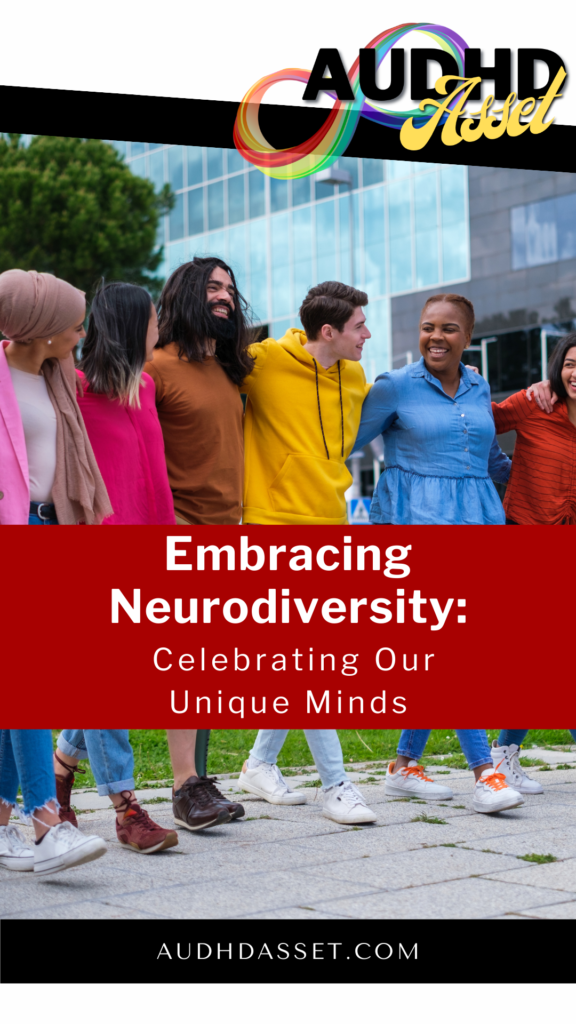Imagine a world where neurodiversity isn’t just acknowledged but celebrated. We’ll explore what neurodiversity really means, why it’s essential to understand, and how it’s challenging traditional perspectives on the human brain, mental health, and the way we function.
Neurodiversity is a captivating concept that redefines how we view the human brain. It goes beyond the traditional understanding of neurological differences as mere disorders, instead celebrating the diversity of neurological conditions and variations in the population.
 Neurodiversity suggests that neurological differences, such as autism, ADHD, dyslexia and others, are simply natural variations of the human brain. Rather than pathologizing these differences, neurodiversity encourages acceptance and appreciation for the unique perspectives and strengths that neurodivergent individuals bring to society.
Neurodiversity suggests that neurological differences, such as autism, ADHD, dyslexia and others, are simply natural variations of the human brain. Rather than pathologizing these differences, neurodiversity encourages acceptance and appreciation for the unique perspectives and strengths that neurodivergent individuals bring to society.
Acknowledging the Spectrum of Neurological Differences
On one end of the spectrum, there are individuals with neurotypical brains- those whose cognitive functions align with what society often deems as “normal.” On the other end, there’s a spectrum of neurodivergence, encompassing conditions like autism, ADHD, dyslexia, and more. Understanding and acknowledging this spectrum is crucial. It’s not about fitting everyone into a predetermined mold but rather recognizing and appreciating the unique strengths and perspectives that come with different neurological profiles.
Understanding Neurodiversity
Neurodiversity encompasses a broad range of neurological differences, some of the diagnoses or conditions that fall under the neurodiversity umbrella include:
- Autism Spectrum Disorder (ASD)
- Attention-Deficit/Hyperactivity Disorder (ADHD)
- Dyslexia
- Dyspraxia
- Tourette Syndrome
- Bipolar Disorder
- Schizophrenia
- Obsessive-Compulsive Disorder (OCD)
The Importance of Embracing Neurodiversity
Embracing neurodiversity can mean fostering inclusivity among family, school, work, community environments. Doing so will help individuals with neurodivergent diagnoses remain active within their community, challenge stereotypes, biases, as well as harness strengths, unique perspectives, and talents.
 Recognizing the Value of Neurodiversity in Everyday Life
Recognizing the Value of Neurodiversity in Everyday Life
Appreciating the value and strengths of neurodivergent individuals is not just about acknowledging differences; it’s about recognizing the unique perspectives and talents that they bring to the table.
Neurodivergent individuals often offer different ways of thinking and problem-solving. Some neurodivergent individuals excel in paying attention to details that others might overlook. Many exhibit intense passion and dedication in their areas of interest, excel in pattern recognition and can make connections that may not immediately be apparent to others.
Neurodivergent individuals possess a unique ability to think outside the box and demonstrate high levels of empathy and understanding, and the one that can be seen among the many neurodivergent diagnoses, neurodivergent individuals develop resilience and coping skills in navigating the world that might not always understand or accommodate their differences.
Overcoming Challenges and Barriers
Overcoming obstacles requires a combination of understanding, support, and fostering an inclusive environment.
- Education and acceptance campaigns can help dispel myths and reduce stigmas surrounding neurodivergent conditions.
- Encouraging inclusive social environments and promoting neurodiversity awareness can also contribute to greater acceptance.
- Creating sensory-friendly spaces and accommodations in public places, schools, and workplaces can make environments more inclusive for individuals with sensory sensitivities.
- Implementing alternative communication methods, such as visual supports or assistive technology, can enhance communication for those facing challenges.
- Promoting neurodiversity in the workplace involves creating inclusive hiring practices, providing accommodations, and fostering a supportive work culture.
- Individualized education plans (IEPs) and accommodations can help neurodivergent students succeed in mainstream educational settings.
- Accessible mental health support services and resources tailored to neurodivergent individuals can be crucial. Reducing societal stressors and promoting mental health awareness contribute to overall well-being.
- Advocacy for inclusive policies and legal frameworks that protect the rights of neurodivergent individuals is essential. This includes anti-discrimination laws and accessibility regulations.
 Addressing Societal Misconceptions
Addressing Societal Misconceptions
There are many different societal misconceptions that are crucial to be addressed in order to foster understanding and promote inclusivity. These misconceptions include believing that neurodivergent diagnoses are a problem to be fixed, that all neurodivergent individuals are the same, that they lack empathy, they cannot succeed in certain fields, they do not want social interactions, that neurodivergence is a modern phenomenon, they lack intelligence, and all neurodivergent individuals need the same supports.
By challenging these misconceptions through education, personal stories, and promoting positive representations, we can contribute to a more informed and accepting society that embraces neurodiversity.
Promoting Neurodiversity Acceptance
Promoting neurodivergent acceptance is a vital step towards building an inclusive and compassionate society. Some strategies to foster acceptance include:
- Develop campaigns that educate the public about neurodiversity, dispelling myths and promoting accurate information.
- Implement training in schools, workplaces, and communities to foster understanding and empathy.
- Advocate for accurate and positive portrayals of neurodivergent individuals in media, showcasing their strengths, talents, and diverse experiences.
- Encourage sharing personal stories of neurodivergent individuals to dehumanize their experiences and challenges.
- Teach respectful and open communication to avoid perpetuating stereotypes or biases.
- Create sensory-friendly environments in public places, schools, and workplaces to accommodate individuals with sensory sensitivities.
- Establish and promote support groups for neurodivergent individuals and their families to connect, share experiences, and find understanding with the community.
- Encourage inclusive activities that allow neurodivergent individuals to participate and contribute to community life.
We can work towards creating a society where neurodivergent individuals are accepted, valued, and empowered to thrive. It’s a collective effort that requires ongoing education, open dialogue, and a commitment to creating environments that embrace neurodiversity.
Media Representation and Storytelling
While there has been progress in media representation of neurodiversity, there are still several issues that need attention and improvement.
- Neurodivergent characters are often portrayed through stereotypical lenses, reinforcing inaccurate and limited representations.
- Neurodivergent characters are frequently played by neurotypical actors, limiting opportunities for authentic representation.
- Media often highlights neurodivergent individuals only in extraordinary circumstances, contributing to a narrow understanding of their everyday lives.
- Media tends to focus on a few specific neurodivergent conditions, neglecting the multitude of experiences within the neurodivergent community.
- Challenges faced by neurodivergent individuals are sometimes portrayed in a negative and pity-inducing light.
- Stories about neurodivergent individuals are often told from an outsider’s perspective, neglecting the voices of neurodivergent storytellers.
- Media sometimes uses insensitive language or imagery that perpetuates harmful stereotypes or misconceptions about neurodivergent individuals.
Addressing neurodiversity, educating, and collaborating between neurodivergent individuals, advocacy groups, and audiences can help us all foster a more inclusive and accurate representation of neurodiversity.
Fostering neurodivergent acceptance is an essential journey toward building a more inclusive and compassionate society. It’s not just about recognizing neurological differences; it’s about embracing the rich tapestry of diverse minds that contribute to the collective human experience.



